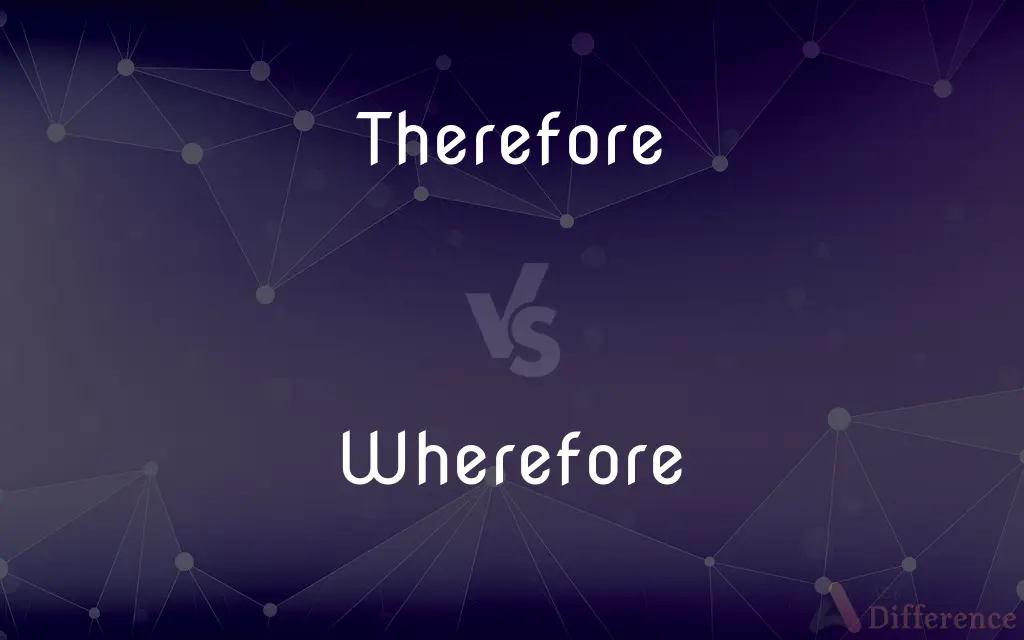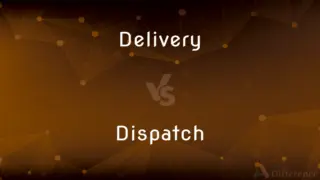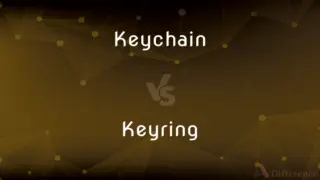Therefore vs. Wherefore — What's the Difference?
By Urooj Arif & Fiza Rafique — Updated on March 18, 2024
"Therefore" indicates a conclusion or result, often used to show causality, while "wherefore" asks 'for what reason' or 'why', now rarely used and often confused with "therefore".

Difference Between Therefore and Wherefore
Table of Contents
ADVERTISEMENT
Key Differences
"Therefore" is commonly used in both formal and informal contexts to introduce a logical conclusion or the result of a given premise. For example, if it is raining, one might say, "It is raining; therefore, I will take an umbrella." Whereas, "wherefore" is an archaic term that is often mistaken to mean the same as "therefore" but actually means "why" or "for what reason". For instance, in the famous line from Shakespeare's Romeo and Juliet, "Wherefore art thou Romeo?" Juliet is asking "why" Romeo is named that, questioning their family feud, not "where" he is.
In academic writing, "therefore" is frequently used to introduce conclusions derived from a set of observations or arguments, linking cause and effect. On the other hand, "wherefore" is rarely used in contemporary writing due to its archaic nature and potential for misunderstanding, but when it is, it's typically to ask a question about the reasons behind a particular state of affairs.
In logical arguments, "therefore" is often preceded by premises that support a conclusion, serving as a crucial component of syllogisms and deductive reasoning. "Wherefore," however, would be used at the beginning of an inquiry into the causes or justifications for the premises themselves, though its use in this context is now almost entirely historical or literary.
The use of "therefore" can be seen in mathematical proofs and scientific papers to denote the next step in a logical sequence or the derivation of a result. "Wherefore," if used at all in modern contexts, might appear in poetic or philosophical texts to evoke a classical or formal tone, questioning the underlying reasons for an observed phenomenon.
The confusion between "therefore" and "wherefore" largely stems from their similar constructions and the outdated nature of "wherefore." Educators and writers emphasize the importance of understanding the distinction to avoid miscommunication, especially in formal writing or speech.
ADVERTISEMENT
Comparison Chart
Meaning
Indicates a conclusion or result from a given premise.
Asks for the reason or cause behind something.
Usage Context
Common in formal and informal writing and speech.
Rare, mostly archaic, used in literary or classical texts.
Example Sentence
"It was raining, therefore, I took an umbrella."
"Wherefore do we exist?" (asking for the reason or purpose)
Common Confusion
None, widely understood.
Often confused with "therefore" or "where."
Typical Preceding
A premise or set of observations.
A statement or situation that prompts a question about reasons.
Compare with Definitions
Therefore
Used to introduce a logical conclusion from a given set of facts.
He forgot his umbrella; therefore, he got wet in the rain.
Wherefore
Archaic term for asking the reason or cause.
Wherefore did the empire fall?
Therefore
Denotes a cause-and-effect relationship.
The road was icy; therefore, driving conditions were dangerous.
Wherefore
Seen in classical literature and philosophical texts.
Wherefore is justice important in society?
Therefore
Often used in formal arguments and presentations.
The experiment was a success; therefore, we can proceed to the next phase.
Wherefore
Rare in contemporary speech, except to evoke an old-fashioned tone.
Wherefore dost thou doubt thy fate?
Therefore
Essential in mathematical and scientific reasoning.
All men are mortal; Socrates is a man; therefore, Socrates is mortal.
Wherefore
Often misunderstood as where due to its construction.
Wherefore are these changes necessary? (asking why)
Therefore
Can be replaced by synonyms like hence or thus in some contexts.
She was the only candidate with experience, therefore she got the job.
Wherefore
Used for stylistic or poetic effect in modern writing.
Wherefore do the stars shine?
Therefore
For that reason or cause; consequently or hence.
Wherefore
For what purpose or reason; why.
Therefore
(conjunctive) Consequently, by or in consequence of that or this cause; referring to something previously stated.
Traditional values will always have a place. Therefore, they will never lose relevance.
Wherefore
Therefore.
Therefore
For that; for it (in reference to a previous statement)
Wherefore
A purpose or cause
Wanted to know all the whys and wherefores.
Therefore
For that or this reason, referring to something previously stated; for that.
I have married a wife, and therefore I can not come.
Behold, we have forsaken all, and followed thee; what shall we have therefore?
Wherefore
Why, for what reason, because of what.
Therefore
Consequently; by consequence.
He blushes; therefore he is guilty.
Wherefore
Therefore.
Therefore
(used to introduce a logical conclusion) from that fact or reason or as a result;
Therefore X must be true
The eggs were fresh and hence satisfactory
We were young and thence optimistic
It is late and thus we must go
The witness is biased and so cannot be trusted
Wherefore
(archaic) Because of which.
Therefore
As a consequence;
He had good reason to be grateful for the opportunities which they had made available to him and which consequently led to the good position he now held
Wherefore
An intent or purpose; a why.
Wherefore
For which reason; so; - used relatively.
Wherefore by their fruits ye shall know them.
Wherefore
For what reason; why; - used interrogatively.
But wherefore that I tell my tale.
Wherefore didst thou doubt?
Wherefore
The reason why.
Wherefore
The cause or intention underlying an action or situation, especially in the phrase `the whys and wherefores'
Wherefore
For which reason;
Wherefore do I receive this honor?
Common Curiosities
Are there any synonyms for "therefore" that can be used interchangeably?
Synonyms for "therefore" include "thus," "hence," and "consequently," though subtle differences in usage may apply.
How can I remember the difference between "therefore" and "wherefore"?
Remember that "therefore" is used to introduce a conclusion ("there" points to the result), while "wherefore" asks for a reason ("where" points to the cause, despite its misleading appearance).
Is "wherefore" still used in modern English?
"Wherefore" is rarely used in modern English and is considered archaic, mainly appearing in classical literature or for stylistic purposes.
Can "wherefore" be used in place of "therefore"?
No, "wherefore" cannot be used in place of "therefore" as it means "why" and not "as a result of."
What is the role of "therefore" in logical arguments?
In logical arguments, "therefore" is crucial for indicating the conclusion that logically follows from the premises.
What does "therefore" imply in a sentence?
"Therefore" implies a conclusion or result that logically follows from the preceding information or arguments.
Can "therefore" start a sentence?
Yes, "therefore" can start a sentence when it is introducing a conclusion or result that follows from the previous sentence.
Is it correct to use "therefore" in casual conversation?
Yes, "therefore" can be used in casual conversation to indicate a logical conclusion or result from a previous statement.
What is an example of "wherefore" used correctly?
An example is "Wherefore was this decision made?" which correctly asks for the reason behind the decision.
Why is "wherefore" often confused with "where"?
"Wherefore" is often confused with "where" due to its archaic nature and the similarity in spelling, but "wherefore" asks "why" and not "where."
In what contexts might "wherefore" still be appropriate?
"Wherefore" might be appropriate in literary, poetic, or philosophical texts, or when deliberately invoking an archaic or formal tone.
How does the misuse of "therefore" and "wherefore" affect comprehension?
Misusing "therefore" and "wherefore" can lead to confusion and misinterpretation of the intended meaning, especially given "wherefore's" archaic nature.
Can "wherefore" be considered outdated?
Yes, "wherefore" is generally considered outdated and is rarely used in contemporary English outside of specific contexts.
Share Your Discovery

Previous Comparison
Delivery vs. Dispatch
Next Comparison
Keychain vs. KeyringAuthor Spotlight
Written by
Urooj ArifUrooj is a skilled content writer at Ask Difference, known for her exceptional ability to simplify complex topics into engaging and informative content. With a passion for research and a flair for clear, concise writing, she consistently delivers articles that resonate with our diverse audience.
Co-written by
Fiza RafiqueFiza Rafique is a skilled content writer at AskDifference.com, where she meticulously refines and enhances written pieces. Drawing from her vast editorial expertise, Fiza ensures clarity, accuracy, and precision in every article. Passionate about language, she continually seeks to elevate the quality of content for readers worldwide.
















































